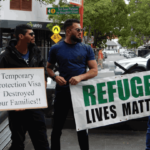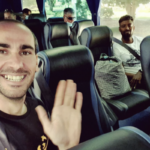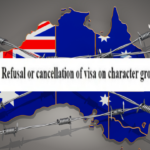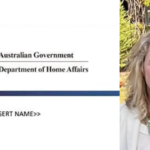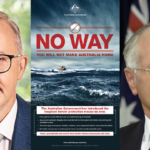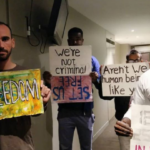Albanese’s Destroying 10,000 Refugees’ Lives, Says Encampment for Permanent Visas’ Aran Mylvaganam
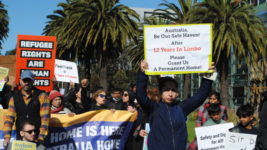
After people have fled persecution overseas and risked their lives to get to Australia by boat and are currently living amongst us in the community, some of whom have been here for up to 12 years, why is the Albanese government continuing to deny them permanent protection?
When federal Labor took office in May 2022, it was promising to assist the 29,000 refugees living here without permanent protection in gaining it.
But when it came to the crunch in February 2023, the government granted permanency to 19,000 of the legacy caseload, and left a further 10,000 refugees in legal limbo.
These 10,000 people are no different to the Biloela family, and federal Labor decided to grant them permanency, even though the Coalition had been persistently trying to deport them. And it did the same for 19,000 other people on temporary visas, even though the Liberal Nationals wouldn’t.
Yet, then there are these remaining 10,000 refugees long living here, who were denied visas, via the Coalition’s notorious Fast Track Process, which Labor admitted was flawed and abolished this year, and these people continue to be subjected to uncertainty and desperation in the “lucky country”.
The Encampment for Permanent Visas
These refugees left unprotected and their supporters are currently staging a 24/7 encampment protest out the front of the Home Affairs Department offices in Naarm-Melbourne’s Docklands and by all accounts, it’s gaining momentum.
Those mobilising are calling on the Albanese to extend permanent protection to these people, rather than the permanent punishment that the Liberal Nationals had subject them to, which federal Labor is continuing in a manner that’s somewhat akin to plight of the Biloela family under the Coalition.
These people, people just like us, are already living in Australia, yet the government is purposefully punishing them, as did the current opposition, so they’re calling on Albanese to make good on his election promise and provide them with permanent protection before the next national vote.
A campaign that’s picking up
But since a late 2023 High Court decision resulted in some immigration detainees being released into the community, the divisive and racist refugee rhetoric has become a part of federal politics once again, and it’s now shaping up to be an election issue.
While currently, Labor has an extremely draconian refugee bill before the Senate, after it passed the lower house, which, as founder of the Tamil Refugee Council Aran Mylvaganam points out, contains laws that would have seen the Biloela family parent’s sent to prison for attempting to remain here.
Sydney Criminal Lawyers spoke to Mylvaganam about the pace in which the campaign is building, as it now sees similar such actions in Sydney and other capital cities, along with how the same public that supported the Biloela family would surely agree that these 10,000 people should be protected.
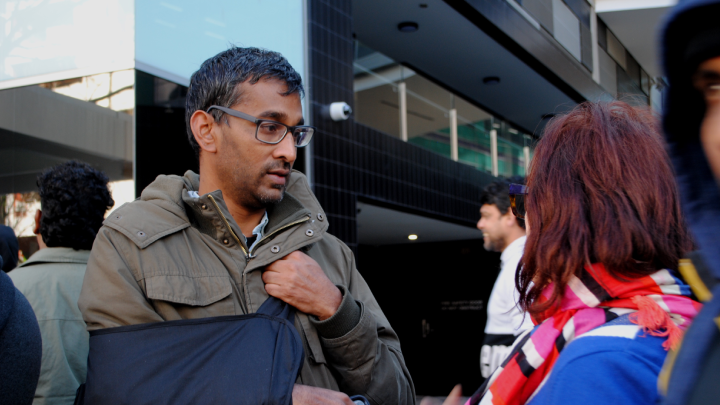
Currently, refugees who continue to be denied permanent residency after living in the country for up to 12 years and their supporters have been staging a monthlong 24/7 protest encampment, which is now outside the Home Affairs office on Bourke Street in Docklands.
Aran, today, 13 August, is the 30th day of the Refugee Encampment for Permanent Visas. So, how is the protest action going?
The action outside the department started in Oakleigh, outside the office of then home affairs minister Clare O’Neil for the first two weeks.
Then, when she was moved as part of the cabinet reshuffle, and Tony Burke became the home affairs minister, we moved the protest from Oakleigh to the Department of Home Affairs in Docklands.
When we started, on the first night, there were only two tents set up. But by the time we moved away from Clare O’Neil’s office we had about 12 tents, and if you were allowed to set up tents here, we’d need up to 30 to 40 of them.
Last night, we had about 40 to 50 people sleeping outside the department building.
It’s gaining in strength. Yesterday, we had a lunchtime action outside the Labor Party head office. Around 250 to 400 people attended this rally that was happening at lunchtime on a Monday.
I’ve attended so many refugee rallies over the last 16 to 17 years, and this was a very different rally. It was extra energetic. Everybody was involved and chanting.
It felt like a massive crowd. We marched from the Labor Party’s office to Channel 7 and then came back to the encampment, and after we turned up at the department building, the department struggled to operate because there were so many people.
We were everywhere. They had to keep the doors closed. They didn’t let any people go in. The workers were escorted by security. Although we were telling the workers that we weren’t going to be in the way of their movement.
It was a big rally, and you can see the encampment is growing in strength, day-by-day. And the refugees have repeatedly said that they’re not going to go anywhere until they get a response from the Labor government.
It was the Labor government that created this mess in the first place in 2012 and 2013, when they were in power.
They were the ones who deliberately delayed assessing visa applications or they assessed applications and found that people were refugees but didn’t grant them permanent visas anyway, which meant that all these people ended up in the hands of the Coalition.
Then the Coalition put them through a new process, the Fast Track Process, which was never fast or fair.
The Labor government, while it was in opposition, acknowledged it was a flawed process. And recently, it abolished the Fast Track Process and got rid of the Immigration Assessment Authority, but all the victims of it are left in limbo.
In 2022, the Albanese government came to office promising to reform the temporary visa issue regarding a group of people known as the legacy caseload.
This implied providing permanent protection to around 29,000 individuals who’d arrived seeking asylum by boat circa 2012-13. But when it came to the table with the reform in early 2023, it only covered 19,000 of the refugees.
However, this left 10,000 long-term community members without permanent protection. Why were these thousands of people discriminated against in this reform?
The 19,000 people who were granted permanent residency were found to be owed protection under the Fast Track Process. They were on temporary protection visas (TPVs) and SHEVs (safe haven enterprise visas).
It was a long-standing Labor policy that they don’t accept these temporary visas. They said they’d abolished TPVs and SHEVs.
So, when they came into power, anybody on TPVs and SHEVs were granted permanent residency through a new visa called the resolution of status visa (RoS).
One thing to highlight is that the long-standing Labor policy, that they don’t grant TPVs and SHEVs to refugees, and the supposed abolishing of the TPVs and SHEVs, only applied to refugees who have arrived in Australia between around 2012-13 until February 2023.
So, anybody who has been found to be a genuine refugee since February 2023 has not been given permanent residency, but instead Labor is continuing to grant TPVs and SHEVs.
They haven’t abolished TPVs and SHEVs, although it is a common misconception, even amongst refugee supporters.
So, this issuing off permanent protection was only provided to those who were processed before February last year?
Anybody who had arrived in Australia before February 2023, and were found to be owed protection, were the ones given permanent residency.
So, if you have been found to be a refugee post-February 2023, you are still given temporary visas.
Also it is Labor’s long-standing policy that they want to give permanent visas to refugees, they actually haven’t abolished temporary ones, and they continue to grant TPVs and SHEVs to refugees found to be owed protection in Australia.
The 10,000 refugees are a mixed group. Some came to Australia before August 2012, when the Gillard government came up with some changes in the law, which meant that some refugees, who were found not to be owed Australia’s protection, were then not issued any bridging visas and don’t have any work rights or access to Centrelink and Medicare.
Then there is another group who were sent to Manus and Nauru, and because they were sent there briefly, they were not granted bridging visas, so they’ve kind of lived here for the past 12 years without any visas.
They have no work rights and no Medicare. They survive in the community through support from friends and family members.
Another category were refugees found to be owed protection but the Labor Party delayed giving them permanent visas, and then they were put through the Fast Track Process.
All of these refugees, once the Coalition came into power in 2013, were put through the Fast Track Process, with this being accompanied by country reports, which described the situations in Sri Lanka, Iran and other countries in a manner that undermined the reality.
So, these country reports were written and aided the Fast Track Process in denying all these refugees protection visas. In fact, the UK High Court called Australia’s country report on Sri Lanka not credible.
The Fast Track Process was used to deny all these people protection. Then Labor came into power two years ago, and there was so much hope in the refugee community that Labor would rectify all the mistakes that the Coalition had made.
It was hoped that all the refugees that were left behind got permanent visas. Labor then granted 19,000 refugees visas and excluded the 10,000 others.
Before Labor came to power, every fortnight, I was organising a funeral for a refugee dying in their sleep. And that stopped when Labor came into power.
But now after two years of them being in power, people are losing hope that they’re ever going to see meaningful change from the Labor government.
We’ve seen one person die recently in his sleep and the coroner couldn’t find the cause of death.
It’s the hopelessness. People are living in limbo. Children born in this country are not able to access higher education. And all of this combined together has led to this encampment.
Refugees don’t want to go to another election with their situation unresolved. We don’t want to see a Dutton government come in and put these people through a new process and try to kick them out of the country.
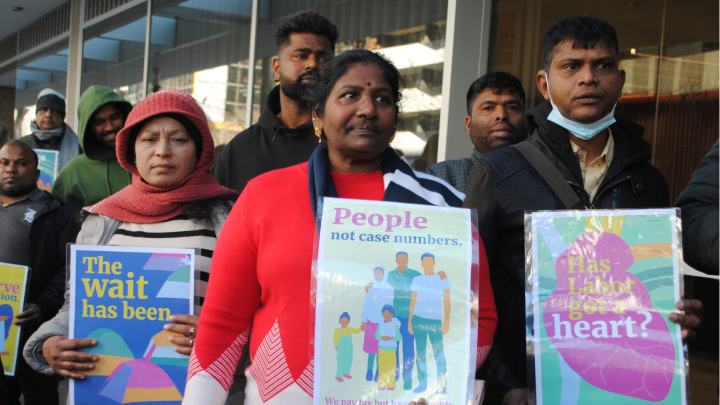
You’ve been a prominent figure in the refugee movement over the entire time these people who’ve risked their lives fleeing their countries by boat have been left in this legal limbo.
These people have been living amongst us in the community – some for up to 12 years now. And there’s also been a long-time subtle understanding that they’re not leaving.
So, what purpose do you consider it serves to keep them on temporary visas, living in a state of uncertainty? What purpose does it serve Labor to have gone two-thirds of the way with its promise of permanency?
We are all struggling to understand why the Labor government is excluding these 10,000 refugees. It doesn’t make any sense. We can only speculate.
It could be that they want to use these refugees to show that they are still strong on borders. That is the only explanation I can come up with.
There are still handing refugees who come on boats back to the Sri Lankan Navy or towing them back to Indonesia. They are locking up people in offshore detention centres.
I really don’t know what purpose it serves to keep these people in limbo. It’s destroying people. It is making them unproductive. Children are growing up being treated like second-class citizens.
There are a lot of young children who are capable of completing university degrees, who could become fine workers, but they’re being held back because of Labor choosing to play politics with their lives.
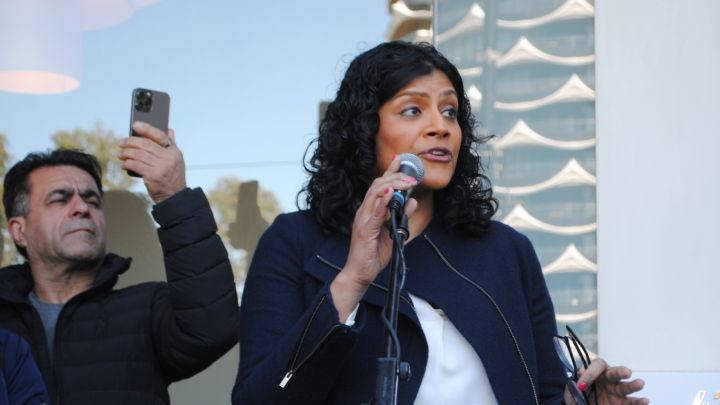
Right before Labor granted permanency to two-thirds of those it had appeared to promise it to, it renewed Nauru’s status as a regional processing centre. And it later removed all the asylum-seeking detainees from the island, but now people are back there.
Meanwhile, there are still some former detainees from the Manus Island facility dumped in Papua New Guinea with no supports.
Why is the government keeping Nauru running when for years now it’s been close to empty and alternative local measures could be undertaken?
Labor for a long time has been trying to match the Liberals when it comes to the treatment of asylum seekers.
Back in 2012-13, when Gillard was in power, they came up with the Enhanced Screening Process, which was probably the worst thing that any government has done to refugees in the last 20 years.
It’s one of the worst policies that affected refugees from Sri Lanka, where over 1,000 refugees were handed over to the Sri Lankan Navy without even their asylum applications being accessed, at a time when Sri Lanka became the number one country in the world for the most disappeared people.
All I can say is that Labor is trying to prove to the racist population that they’re pretty much the same as the Liberals when it comes to the treatment of asylum seekers.
While Albanese was campaigning to be elected, he said that he would be strong on borders and compassionate towards people. But that is definitely not the case.
They are “strong” on borders and at the same time they’re inflicting much cruelty on people as well. People are suffering under the Albanese government.
Like you said, in Papua New Guinea, a lot of people are still stranded, facing an indefinite future.
A lot of the refugees who were evacuated under Medevac from Manus are now living in limbo in the Australian community. And all the refugees that have come here and been on bridging visas are struggling too.
As well, so many Australian-born kids are suffering. There is nothing compassionate about this government.
The other major refugee-asylum seeker development under Albanese was that the High Court ruled late in 2023 that indefinite detention when there is no real prospect of deporting a detainee to their country of origin in the near future is unlawful.
This led to 150-odd “unlawful noncitizens” being released into the community and the government then passed laws to allow these people to be re-detained for up to three years if deemed a risk.
Then another case came before the High Court in May, which could have seen 200 more indefinite detainees released. The decision on the individual involved in that case was not to release them, and therefore, there was no prominent release of detainees.
But in preparation for such a release, the government introduced the Migration Amendment (Removal and Other Measures) Bill 2024, which has been passed through the lower house and is now sitting before the Senate.
These laws have been described as draconian. What sort of threat do you consider they pose?
The 2023 High Court win was sensationalised in the mainstream media. The real story was lost. The real story was lost as a result of mainstream media sensationalising the High Court decision.
Basically, there are two different treatments in Australia. If you are an Australian citizen and you commit a crime, you go to gaol, serve your sentence and then you get out and re-enter the community. And a lot of people are fine after that.
But when it comes to migrants, you get punished by the courts, you serve the gaol sentence and then you get released into the community, but the moment you get released, Home Affairs picks you up and puts you in detention, where you’re kept there for many years.
If the person is a refugee, they can’t send them back, so they stay in detention. If they’re not a refugee, they attempt to deport them.
And that is what that High Court decision centred around: the minister punishing people indefinitely after they serve their sentence for their crimes.
The majority of the people released into the community had only committed minor crimes. And they deserved a second chance. But somehow the mainstream media and right-wing politicians found a way to misinterpret the real story and, as a result, there was so much backlash.
Then there is that new bill in parliament. So, when there was much community backlash, in order to make themselves look really tough, then home affairs minister Clare O’Neil and then immigration minister Andrew Giles got together and came up with this deportation bill.
If it became law, it would have a devastating impact on the 10,000 refugees without a visa living in the community. It would make it easier for the government to deport anyone whenever they want it.
This is history repeating itself. Back in 1993, it was the Labor government that brought in mandatory detention. And the Coalition government took it to a new level.
This was the same thing with the Enhanced Screening Process that the Gillard government brought in, and the Coalition government took it to new extremes.
Now, these deportation laws, if the government attempts to pass them, will destroy so many lives.
This government got elected after promising the Biloela family their freedom. But a lot of these refugees are in the same situation as the Biloela family.
If this bill was around when the Coalition was in power, the Biloela family would have been deported back to Sri Lanka long ago.
They wouldn’t have been able to fight the deportation. Under these laws, if they fought the deportation in the way that they did, the mother and father would have been in gaol and the children would have been in state custody.
It is so heartbreaking to see the Labor government, rather than being on the side of vulnerable people, choosing to appease racist elements in the Australian population.
So, that bill targets these 10,000 people, basically, and it criminalises them if they don’t assist the government in its attempts to send them back to the country from which they fled?
Exactly. That is what it does. Any refugees not agreeing with their own removal, could be sentenced to gaol under these laws.
They would be breaking the law for refusing to take part in their own deportation back to potential danger.
If I fled from Sri Lanka and because of a flawed Fast Track Process, I’ve been found not to be owed protection, and because the reports that have been written are against me, but I am still fearful of going back and then refuse to assist them in sending me back, then I am put in gaol, and then eventually, I’ll be deported back.
It is a really cruel law.
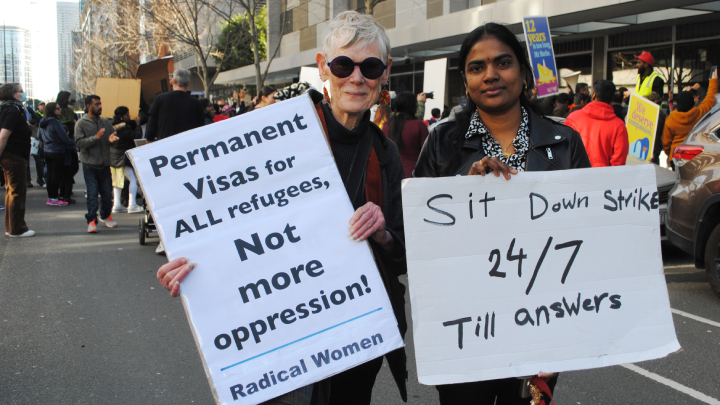
The High Court developments and related laws brought anti-immigration rhetoric to the fore in Australian politics again.
Yet, despite the court and the law matters having died down, the divisive refugee rhetoric is continuing and appears likely to escalate towards the next election.
In your opinion, why is this happening now? Why is the temperature continuing to turn up despite the apparent court-related fears having died down?
There is anti-immigrant sentiment now playing out in many parts of the world, particularly in Europe, and there is an audience for this in Australia.
Having Peter Dutton as the opposition leader, who’s a man that’s quite comfortable in engaging in divisive politics when it comes to refugees is concerning.
There haven’t been any refugees coming to Australia in big numbers and yet, it seems like it’s a big issue that’s likely to dominate the election campaign.
And this is the Labor Party’s doing. The way they’re keeping certain issues unresolved means that this issue is becoming an election issue when it shouldn’t be.
Ten thousand people is nothing compared to the number of people we are taking into this country. The Labor government could resolve their issue tomorrow and no one would even notice.
The Labor Party is keeping this issue alive.
And lastly, Aran, there was a huge turning away from the major parties at the May 2022 election, and since that time, the political climate in this country has continued to shift away from major party thinking, and this has been due, not in the least, to the genocide in Gaza and the government’s support of it.
In terms of refugees and asylum seekers arriving by boat the bipartisan major party policy approach has long been to punish them.
So, do you consider the pressure is building to the point where the 10,000 refugees will be granted permanency?
The refugees are in a desperate situation. They don’t want to be in a situation where another election comes and this issue remains unresolved, they’re quite fearful of Peter Dutton coming to power and what that means for their future in this country.
They’ve been put in a desperate situation taking part in this campaign. I’m not sure if it will win mass support from the community. The Biloela family campaign did win quite a lot of support.
So, if people know that many thousands of refugees are in a similar situation to the Biloela family, maybe they will rally behind them as well, and we would get a lot of support.
Certainly, we are trying to win hearts and minds. We haven’t had any media support so far. The mainstream media hasn’t been supporting us. We haven’t had too many politicians coming to meet with these refugees either.
It’s an uphill battle. We understand that a lot of people are staying silent because Labor is in power, and we are hoping they will break their silence and come and stand in solidarity with these people and see some meaningful change.
All pictures taken by photographer Sumitra Vignaendra


